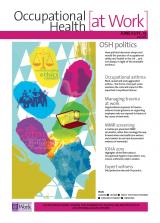June/July 2015 (vol. 12/1)
ContentsFeaturesNewsLegal
NewsResearch DigestResearch PlusCPD
Research Plus
Psychosocial factors in work-related injuries
Work-related stress at least doubles the risk of lost-time work-related injuries, this large-scale prospective study of nearly 7,000 workers in Norway suggests. The sample was drawn from a general population survey, with workers followed up for three years. In total, 112 workers reported having had a work-related injury leading to time off work within the previous 12 months. After adjustment for sex, age, occupation, shiftwork and heavy work, significant predictors (p < 0.01) of injury were: high job strain (odds ratio (OR) = 2.38; CI 1.24–4.58); high role conflict (OR = 2.09; CI 1.18–3.72), and high emotional demands (OR = 2.22; CI 1.36–3.62) measured at the beginning of the study. The same three factors were also significantly predictive (p < 0.01) of injury when measured (and averaged) across the three years. The population attributable risks are estimated at 11% for job strain and 14% both for role conflict and emotional demands.
Occupational Health at Work June/July 2015 (vol. 12/1) pp36



